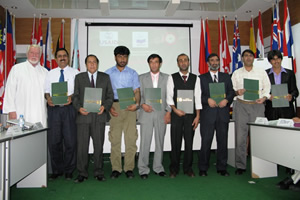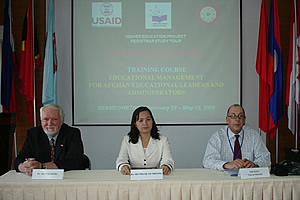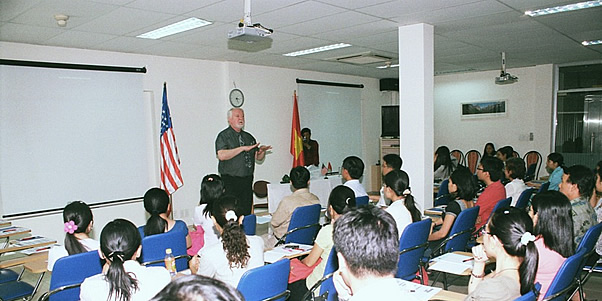A Professor's Journey
Sociologist Reflects on Travels, Teaching in Southeast Asia
May 5, 2009
By Dennis F. Berg
I first started traveling in this part of the world in the late 1980s. I accompanied former Cal State Fullerton President Jewel Plummer Cobb to Japan and Taiwan. Then, along with Linda Anderson (emeritus professor of French) and P. Christopher Cozby (emeritus professor of psychology), we traveled in China following up on initiatives began by Dr. Cobb and Jack W. Coleman (emeritus vice president for academic affairs and professor of accounting) the year before. Our interests began with developing exchange programs in Asia and initiating activities meant to strengthen the system of higher education in China.
It wasn’t until 1991 that I make it to Vietnam, when I accompanied Son Kim Vo, former coordinator of the Intercultural Center on campus, and a group of English teachers on a workshop tour to Hanoi and Ho Chi Minh City. The stark difference in need between Vietnam and all of its neighboring countries where I had been working was so dramatic that I knew from the very first days that Vietnam would become the focus of my attentions. And, of course, the lingering memories and guilt concerning the war that defined my generation were very much a part of my being.
Now, it’s 2009 — 18 years later. My, how time flies when you are having fun.

Dennis F. Berg, left, with some of his students, after completing one of his courses on higher education in Afghanistan.
I have managed at least one stay in Vietnam each year since 1991 for a variety of reasons: a year as an exchange professor at Vietnam National University in Ho Chi Minh City, another year as a Fulbright Scholar and another as a foreign expert with the Ford Foundation/Social Science Research Institute’s national research training program in Hanoi. Now I am living in Ho Chi Minh City as a faculty scholar on a Vietnam Educational Foundation grant, working to build the research capacity among faculty and students at my host universities.
The spring semester is the hot semester in Vietnam; and March and April are the hot months. High temperatures hover around 95 degrees, with 60 percent humidity. It reminds me of my youth in Mobile, Ala. but, without the conveniences of door-to-door air conditioning, cool automobile rides and comfortable buildings within which to work.
But, then, I’m not here to vacation — although there are many wonderful vacation spots within a short distance from Saigon (Ho Chi Minh City). Beautiful beaches, cool air, good food, no crowds and five-star accommodations if you want, at a bargain price.
I pretty much live and work here now, having retired from Cal State Fullerton last August. While we have a beautiful western-style apartment in a downtown high-rise, we are living in the ’hood; our old neighborhood next to most of my wife’s family members. The family occupies seven houses on Nguyen Thi Minh Khai Street. Walking distance to the University of Social Sciences and Humanities, the U.S. Consulate General’s complex, Southeast Asian Ministers of Education — which sponsors my visa and where I do my regular work — and all of downtown, including Diamond Plaza, the Cathedral, the Tax Store and the famous Rex Hotel. Walking distance when it's not too hot or too humid. Otherwise, the taxi fare is 12,000 (67 cents in America) Vietnamese Dong to almost anywhere. Of course, I am a foreigner and so I tip; I usually don’t go anywhere for less than a $1.11.
I used to write notes home to my friends on a regular basis when everything was new and different and interesting. Now, I have to try to think about what might be interesting to others, even if it is daily life to me.
Educational Comparisons
Do you know that the full-time university faculty member still earns less than $100 a month?
Like many Vietnamese, university faculty must work more than one job in order to make ends meet. A family needs about $300 a month to have a decent standard of living. A challenging set of circumstances for higher education. How do you focus the attention of faculty on their full-time jobs when, in fact, they must worry about a number of different responsibilities? How do you ask faculty to engage in faculty development activities without compensating them for opportunities and income lost?
Many of the university faculty only have bachelor’s degrees. The caliber of advanced degrees within the country is uneven and not strong, and those who go abroad for their advanced degrees often return, if they return, to jobs outside of higher education.
We’ve seen all of these things happen before. China went through these phases in the development of their system of higher education. The educated population had no practical experience concerning how to use their education. The economic structure could not absorb the educated, so many remained unemployed or underemployed. Students going abroad found ways to stay abroad. Students who returned with their degrees were unable to find a place to use their newfound knowledge and talents. Chinese institutions began to impose strict rules for going abroad. The system of higher education in China developed slowly.

Dennis F. Berg, left, recently served as a panelist at Vietnam National University, where he is teaching as part of the Vietnam Education Foundation's U.S. Faculty Scholar Grant program.
Vietnam is a mirror image of the experiences of the Chinese during the 1990s. It is my guess that things will change in Vietnam as they did in China and, over time, the system of higher education will continue to strengthen in the face of insurmountable challenges.
Among the unanticipated consequences of the Chinese students remaining abroad was the web of connections that developed — lifelines of information and resources back to the homeland from students who managed to remain abroad. So, while brain drain has and is taking place in Vietnam, not all of the consequences are negative.
Surviving the Heat
It’s hot in Vietnam. It’s always hot in Vietnam. You can fly to the north during the winter months and find some relief from the heat, but generally it’s hot in Vietnam.
Sometimes, I see the Vietnamese sweating; but often I think us Europeans sweat more than the Vietnamese. We have hair on our body and the humidity condenses easily upon the hairs. It is not unusual for a waitress in a restaurant to reach down and feel the hair on my arms; sometimes pulling it. I think my smile makes them feel comfortable exploring things about a foreigner that they otherwise are unable to explore.
It is also not unusual for us to lose the power in our house. Sometimes it is scheduled and publicized so that we can prepare — if we read Vietnamese and happen to see the small piece in the newspaper. But, often, it is unannounced and unexpected. It can happen any time of day but around 6 a.m. or 8 p.m. isn’t uncommon. When the power goes off all day, it goes off at 7 a.m. and comes back on around 5 p.m. No air conditioner, no fans, no refrigerator, no Internet, no computers. I usually pack up and ask my friends at the Southeast Asian Ministers of Education (SEAMEO) complex if I can join them for the day.
SEAMEO recently scheduled a workshop for high school principals in the highlands, referred to as Tay Nguyen. It’s a politically sensitive area with a larger than usual population of minorities, in provinces bordering Cambodia and the site of anti-government uprising in the recent past. But, it is part of SEAMEO’s charter to provide training to areas that otherwise do not have such opportunities.
So the plans were made. I was scheduled in as the only foreign facilitator and permission was secured from the Ho Chi Minh Security Office for me to go to Tay Nguyen. About half way there — we drove the seven hours in a van since there were five of us and lots of equipment — a phone call came in saying the provincial government would not give permission for a foreigner to work at Tay Nguyen University. That was that. The SEAMEO staff began to make new plans and adjustments to respond to the reality that no way was I going to be allowed to conduct the workshop.
I spent two days in Buon Ma Thout; a nice hotel, good Internet connection, got lots of work done. We asked about tours and found there were no tours available in the area. We managed to take our van and visit a waterfall and a few other places around the city. We found good places to eat and generally enjoyed our time there.
The workshop went well but SEAMEO has decided that it will not return to Tay Nguyen. SEAMEO would rather pay for the Tay Nguyen participants to come to Ho Chi Minh City in the future. I think the whole decision not to allow me to work caught them by surprise more than it did me. I was only surprised that Dr. Thinh and SEAMEO had so little ability to change the provincial leaders' minds.
I am always learning new things about life in Vietnam.
The Art of Walking
I went to lunch the other day with a couple of friends, one from the Institute for International Education and one from the University of Social Sciences and Humanities — one of the campuses of Vietnam National University of Ho Chi Minh City. Walking out the door, the sun was intense and the heat unbearable. Walking along the street, at times the sidewalks are almost impassable. There is a large project to replace many of the sidewalks in Saigon. (We often refer to the city as Saigon unless we are in a formal situation.) But, it is only beginning and creates as many obstacles as it solves.
As I turned the corner out of my alley onto Nguyen Thi Minh Khai, I had to stay in the street since the sidewalk was completely blocked with parked motorbikes. The sidewalks are used as much by the motorbikes as they are by the pedestrians. If you want to go against the grain on a one-way street, you simply ride onto the sidewalk and ride in the opposite direction to the street itself. Apparently, you can avoid being stopped by the police by using this means of finding the most direct way to your destination.
The point is, a pedestrian can never take anything for granted. We must constantly look all directions and watch for both stationary and moving obstacles in our paths. I think this really catches many visitors by surprise. And, the painted crosswalks on the streets; don’t even think about it. They do not mean pedestrian right of way; there is no pedestrian right of way in Vietnam.
This weekend is the April 30 (1975) and May 1 celebration and holidays. Many people will take the four-day weekend and enjoy themselves; travel for vacations within the country. We are thinking about going to Malaysia to escape from the crowds. Airfares are cheap, no visas needed and five-star hotels are running less than $100 a night. We’re going to try.
With May, the rains should come. When the rains finally do come, they will cool down the city a little and keep the streets a little cleaner than they are during the dry season. With the rain comes the flooding. The drainage system in all cities in Vietnam is inadequate. With the floods come the delays and adjustments to life and living that have to be made. In the south, the Mekong will flood as it does every year.
People will move their housing up along the roadsides, which are raised above the normal flood plain. If it rains too much, the delta finds itself in crisis and in need of help to survive through the season. But, in the normal course of things, the flooding will leave the land ready for planting and growing the rice and crops for the next season; the cycle unbroken.
A Full Life
My schedule always seems to be full. My classes are on Friday and Saturday mornings. In addition, I have classes scheduled in Tra Vinh in the Mekong before the flooding comes, an international workshop for participants in Laos, Cambodia and Vietnam; the CSUF workshop on service learning in Cambodia; a weeklong SEAMEO workshop in Cambodia the week after the CSUF activity; and an international meeting and conference in Nha Trang in August, where I will be giving a paper on university branding. This list represents the fact that I have said 'no' to a number of other requests.
That’s about enough for now. It’s Sunday night, and I get to choose which B-level movie I want to watch on Cinemax, HBO or Star Movies.
Every once in a while, AXN entertainment channel will run a good movie and, of course, there is the Disney Channel.
In addition, I can go down to the Tax Store and buy most movies currently in the theaters back home for as little as $1.25. The ladies there won’t sell me the copies with popcorn-chewing people next to the camera or where the raincoat falls in front of the lens. Most of the DVDs I buy come from China and are copied right off of preview DVDs or Academy member copies. Today’s fetch included “Milk,” “Valkyrie,” “The Code” and “Benjamin Button.” So, its time to watch a movie. Good night.
Dennis F. Berg is an emeritus professor of sociology. He has been in Vietnam as part of Vietnam Education Foundation's first U.S. Faculty Scholar Program. He is teaching "Scientific Research Design" and "Methods and Analysis" at Hoa Sen University and Open University. As part of the grant, he teaches students, mentors faculty, works with university administrators on various projects and conducts teacher-training seminars.


